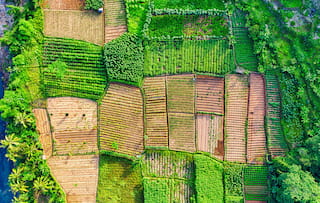Companies deepen supplier relationships as food chains strain under global crises


Diana Copper
Country Director
Every week food industry professionals watch another straw piling onto the proverbial camel’s back. Former Tesco chief Sir Terry Leahy has urged the government to address imminent threats to Britain’s food security. Food prices this April hit an 11-month high. Cocoa prices took a nosedive before Easter after having nearly tripled last year.
While the UK produces a healthy proportion of its own cereals, milk, eggs and meat, around 85% of fruit and nearly half of its vegetable consumption is dependent on imports. Three of the UK’s largest suppliers of fresh fruit - Brazil, South Africa and Colombia - are not climate ready and their agriculture has been highlighted as particularly vulnerable. Export levels to the EU have still not recovered from Brexit and are still nearly 20% lower than in 2019, although things are expected to begin to turn around following the EU-UK trade deal.
The European Union is just as exposed to climate risk. According to a report published recently by Howden Insurance, the bloc’s agriculture sector risks losses €60 billion through catastrophic drought, rising to €90 billion by 2050. Consumer prices, food security and rural economies are at great risk, with farmers shouldering 70-80% of all weather-related farm losses.
It has gotten to the point at which insurance insiders are warning that climate risks will soon exceed what insurers can cover. In the EU, only 20-30% of climate-related losses are insured via public, private or mutual systems, including by Europe’s Common Agricultural Policy (CAP). The study found that pre-arranged protection, often supported by planned public subsidy, is usually far more effective for farmers and their lenders than unreliable, unplanned and unpredictable government funded bailouts.
Multinational companies have been able to rely on commodity markets for over a century. In times of instability, many buyers and traders would turn to a seemingly endless buffet of new suppliers. But this solution does not offer buyers sufficient security anymore. Global brands have already reported financial impacts ranging from $500 million to $1 billion annually due to supply chain vulnerabilities.
The disruptions in soft commodities are the effect of decades of structural under-investment. Aside from a sudden peak in the 1980s, official development assistance to agriculture has been low for decades – according to IFAD, hovering around 5% of total aid budgets. Private-sector investments in agriculture have increased, but they are generally focused on market oriented, high-value production systems and are as low as 7% in developing countries (IFAD).
Climate disruption and brittle value chains are not only a risk to the UK’s food supply. UK companies are concerned about reputational risk as consumers increasingly expect farmers to be properly paid and workers properly protected. Brands are also at risk from the fallout of avoidable human impacts of climate disasters. This comes on top of regulatory compliance burdens from the UK Environmental Act 2021 and EU human rights and deforestation regulations CSDDD and EUDR.

As commodity markets are becoming less and less reliable, companies are shifting towards large-scale, long-term sourcing commitments rather than year-to-year supplier changes. Across our partnerships in fruit and vegetables, cocoa, coffee, edible oils, livestock, feed and grains, we are seeing an increasing move by companies to deepen relationships with suppliers in their sourcing sheds to ensure the future supply they need to keep their operations going.
The UK’s second-largest supermarket chain, Sainsbury’s, has invested in a soy-producing region in Western Mato Grosso on the margins of the Amazon Rainforest, to change the dynamics behind agriculture-linked deforestation. Working with supply chain sustainability platform SourceUp, Sainsbury’s has also invested in protecting the rainforests in Borneo, Indonesia from forest encroachment through palm oil plantations in West Kalimantan.
Unilever established a long-term palm oil sourcing partnership with Indonesia's Aceh province, integrating investments in forest protection to secure a deforestation-free palm oil supply chain. Mars has entered a five-year partnership with Fairtrade and cocoa cooperative Ekookim to improve farmer incomes in Cote d’Ivoire.
Companies are increasingly adopting a landscape approach, recognising that resilient supply chains require collaboration with governments, producers and civil society. In Vietnam’s Central Highlands, a multi-stakeholder partnership including JDE Peet’s, Simexco, ECOM and LDC has supported 85,000 farmers in four districts, across 110,000 hectares to transition to more resilient practices. IDH has been bringing together governments from the local, regional and national level with supply chain companies and civil society, to create landscape partnerships to build resilience in agricultural production areas in delicate ecosystems.
It is clear that fifteen years after Barry Parkin first predicted the decline of the commodity era for agriculture, the financial realities are catching up. Commodity markets are no longer serving our global food chain and business can no longer rely on outdated sourcing models. Companies that fail to invest in long-term sourcing, risk sharing and local value creation will struggle with volatile prices and shrinking supply. The tools for change exist and the business case has been proven. Companies that double down on meaningful supplier relationships, supported by investors who commit to place-based agricultural transformation will be better equipped to weather the food industry’s precarious future.
IDH will be will co-hosting and participating in several events during London Action Climate Week, including discussions on topics related to this article. Find out more here